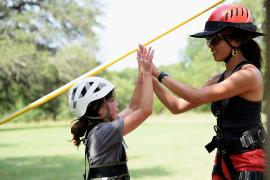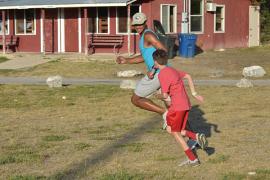I’ll start by being blatantly transparent: we created our certification program with a specific goal: To recruit and retain more qualified and dedicated staff. OK, honestly, just more staff in general. There. I’ve said it. It was selfish in its creation, perhaps, but it has great benefits for our staff as well as for us as a camp. Let me tell you more.
Why We Did It
It came down to asking ourselves what we could offer that potential staff may find valuable and could put us on a more even playing field in the hiring game. As we all know, the current generation of staff has a different — and certainly valid — outlook about work time and what value they are getting for their efforts. Especially for those applicants who have not been to a camp as campers, it was clear that there was a real need for us to give potential hires strong reasoning for why camp would benefit them now and in the future. Almost as importantly, because we know there are outside pressures affecting their independent decision-making, we wanted to give them the language and tools they would need to sell the opportunity to their parents, professors, and advisors. And the certification idea was born.
What Is a Certification?
When we think about certification at camp we often think about The Big Three: First Aid, Lifeguard, CPR. Then of course there are a host of program certifications — archery, smallcraft, etc. Either staff arrive with these certifications, or it’s our job to make sure they get them prior to camper arrival. But certifications aren’t just for lifesaving or program skills.
So what are — and what aren’t — certifications, exactly?
- According to Indeed, a certification is “typically displayed as a document stating that as a professional, you’ve been trained, educated, and are prepared to meet a specific set of criteria for your role.”
- Certifications are credentials, offered by a professional organization or a company that specializes in a particular field.
- It’s earned by passing a test and exhibiting knowledge of the subject/skill in question.
- It is not a degree. There is no academic credit, but rather, it is something that complements your professional experience or education. It’s also not a guarantee of ability or a permanent assessment of skill.
- Certification is also not a legal thing, despite it feeling like such since it is often required for state camp regulations or ACA standards.
So how, then, can one single camp provide a certification program without the resources of the well-known agencies backing them? The answer is in what you’re providing certification for. In the case of our camp, we’re well-known and respected for the skills staff develop in managing social-emotional and behavioral challenges. Our staff work in low-ratio proximity with youth who have significant difficulties, and as such our staff receive extensive pre-camp training and learn a lot very quickly on the job. They are more likely to end the camp day having assisted with several significant behavioral escalations or mental health concerns than having taught a camper to canoe. So, we created a certification program based on that set of skills.
How Does It Work?
Every certification will be different — which we know from all the ones our staff already need. For our camp, we created a two-level system. Level I Care Specialists must (a) successfully complete a 140+ hour staff training curriculum, and (b) demonstrate understanding of content and skills by achieving at least 80 percent on an assessment, for which there are mentored review sessions and opportunities for re-testing as needed. Level I focuses on professional conduct expectations, the behavior management plan, crisis response, camper interactions, social-emotional learning, and the basic expectations of front-line staff.
All staff are expected to be Level I certified by the end of summer, and 95 percent achieve this by the end of staff training. Staff receive a certification wallet card with a summary of skills covered on the back of the card (similar to sending campers home with a swim level achievement card). Additionally, they receive a special pin for their nametag lanyard as part of our staff recognition program.
Level II Care Specialist certification is optional, and it is for staff who are looking to further enhance their leadership and professional competencies throughout their staff experience. At this level, certification requires demonstrated mastery of knowledge as well as hands-on skills through both written and practical components. Level II involves showing the practical application of Level I skills, as well as of advanced topics such as caring for self/others, program instruction, delivery and evaluation, group dynamics, and advanced behavior management.
Staff interested in pursuing their Level II certification must have an endorsement form signed off on by their staff mentor and a sponsoring administrator. They finish their assessment over the final two weeks of camp. Upon completion, Level II staff receive a second wallet card, another pin for their lanyard, a framed certificate and acknowledgement at our final staff celebration, a gift card bonus, and early consideration for leadership roles the following summer.
Are Certifications Right for Your Camp?
The explanation above of how we created our program is just that — an example. There’s no reason a program you create has to follow the structure we have used. And technically, anyone can create a certification program. However, the value of it, and the meaning behind it, will vary based on how it is created, managed, and presented. It works for us because we’re a trusted provider and a well-respected leader in care for youth with very challenging emotional, social, learning and behavioral challenges. The staff experience carries weight; their experience with youth who are at this level of challenge is worth a lot to future employers. You should consider the following when determining if certifications can work for you as a staffing recruitment and retention strategy:
- What is your name recognized for? Do you specialize in inclusion, sports excellence, creative arts, etc.? What can you legitimately claim you do exceptionally well?
- What experience can staff carry forward? What skills, abilities, and experience do staff have after their time in your employ that will set them apart from others?
- Do you believe that by providing certification opportunities, you will significantly expand your applicant pool with more — and more qualified — applicants? Or is this just another “perk” you’d be offering?
What Are the Benefits for Staff?
- It helps them get noticed. Certification is a key term sought on resumes.
- They stand out and get recognition for being committed to learning and developing their skills in a particular industry. It’s like announcing, “hey, I’m in it for the long haul!”
- They’re walking into entry-level interviews much more qualified than many other candidates of similar age or education level.
- Bragging rights. Certification from our camp is not a replacement for degree work or additional training, but rather a point of professional pride and achievement that can be shared with potential future employers.
What Are the Benefits for Camp?
- Setting yourself apart. There’s absolutely nothing wrong with being a camp and offering camp counselor positions. Unfortunately, there are a lot of camps out there that do that, though. If a candidate is choosing between three camps, all with similar pay and benefits, this is a big extra.
- Selling it to the decision-makers. Let’s be honest, not every staff member coming our way is completely in charge of their summer plans. They may need to convince parents, advisors, or schools that their summer plans are worthwhile (of course they are!). This gives them a solid foundation for that case.
- Expanding recognition for the good work you do as an organization.
- Access to grants or other funding sources that support professional development of young adults in preparation for the workforce.
What Should We Consider in Planning a Certification Program?
This is not something to just throw up on the website as a recruitment strategy without significant planning and forethought. Some things to discuss in the early stages are:
- Who will design/implement/oversee it?
- What type of review/assessment will we do to “test” skills?
- What kind of recognition, bonuses, or rewards will come at each level?
- How can employers confirm certification/what does the documentation look like?
- Is there an expiration date?
Of the many questions/concerns you may have percolating at this point, I can provide initial answers to a couple:
1. “I don’t want to guarantee someone’s skills? This seems like a liability?”
Remember, certification does not designate that a person has sufficient knowledge in a subject area, only that they passed a test. The language you use in your certification materials will make this clear. Also, it’s always a good idea to check with your legal advisors or risk management team if you’re concerned here.
2. “Who has time for this?”
Potentially you, if you need to expand your hiring pool?
3. "Seems like a lot of work.”
No comment. :)
So is a certification program a good tool in your recruitment and retention toolbox? It has been for us! Perhaps it can be for you, as well.
This blog was written on behalf of Project Real Job whose purpose is support camps in their efforts to recruit, hire, and retain staff.
Emily Golinsky is the founder of Bright Moose, LLC, which provides training, consultation and professional development to camps, schools and youth organizations, guided by the motto “Help Others Shine Bright!” She sits on the Board of Directors for NHCamps, holds multiple volunteer roles for ACA, New England, is an education advocate for youth with special needs and is a certified MHFA Instructor. Emily has her BS in Health Psychology and MS in Camp Administration & Leadership.She has been the executive director at Camp Starfish (NH) for the past 15 years and is an avid collector of terribly awesome puns. She can be reached at [email protected].
Photo courtesy of Dream Oaks Camp in Bradenton, Florida
The views and opinions expressed by contributors are their own and do not necessarily reflect the views of the American Camp Association or ACA employees.




